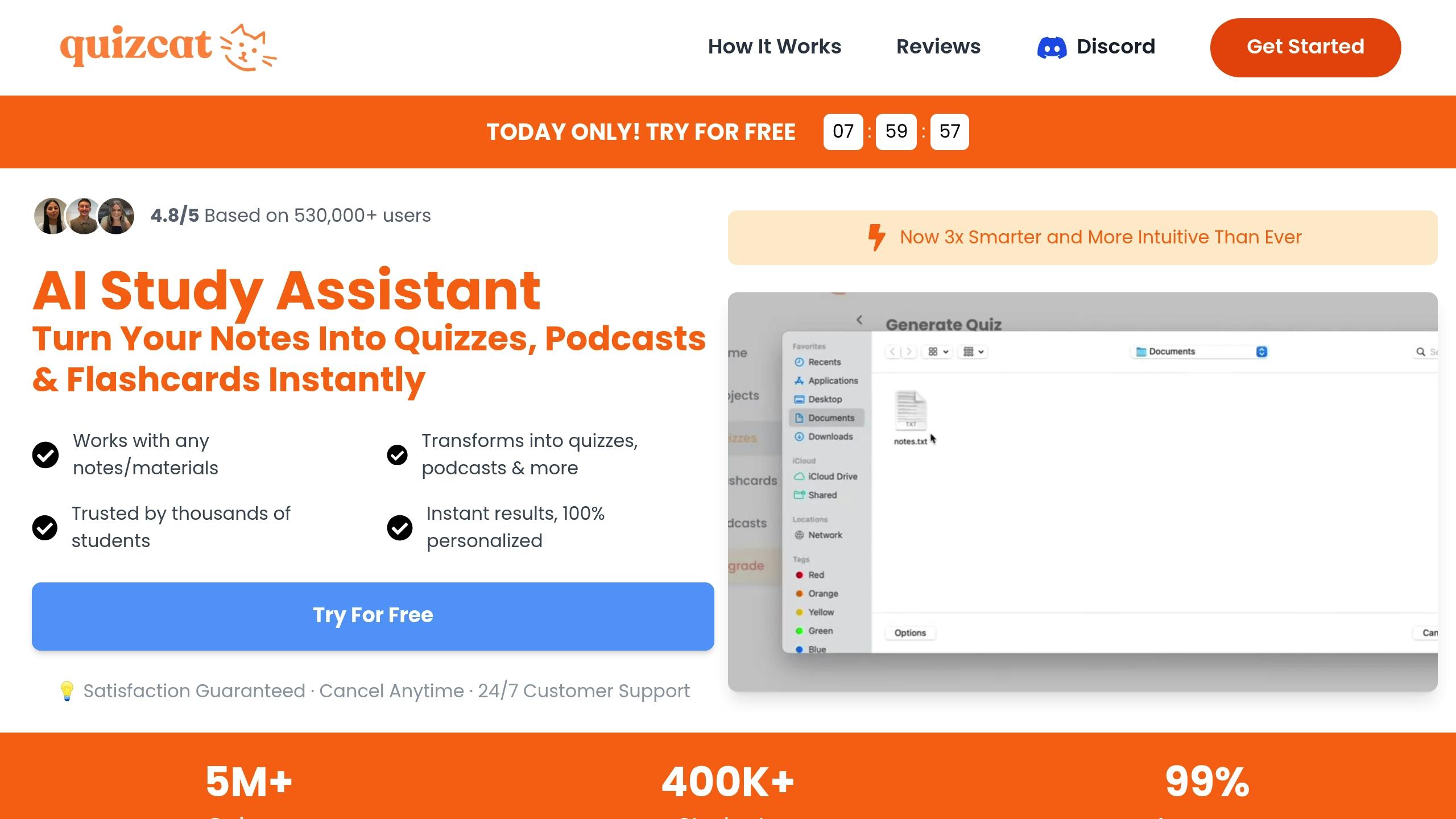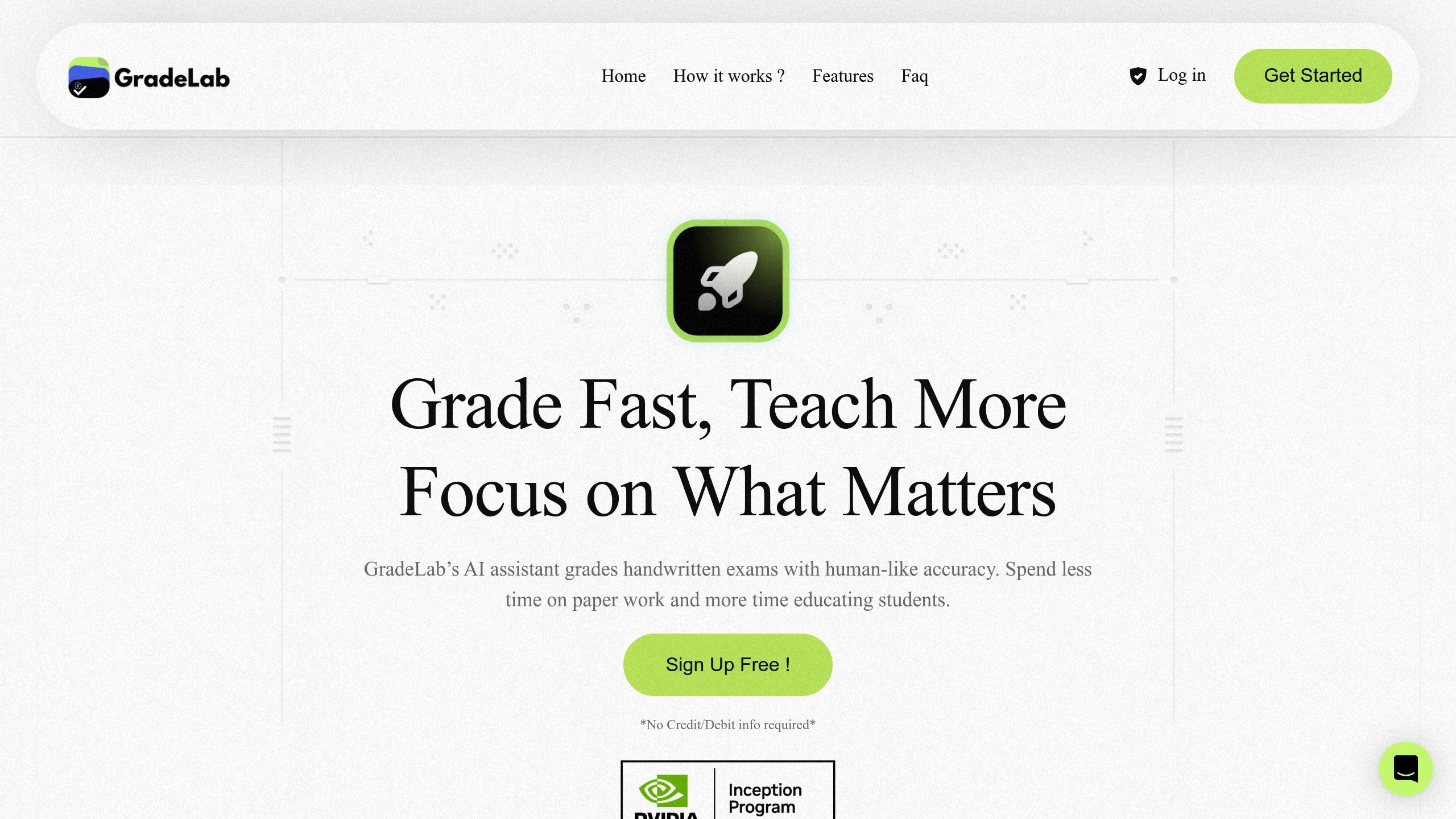
Top AI Tools for LMS Scalability
Struggling with LMS scalability? Here’s a quick guide to the best AI tools that solve common challenges like managing user growth, organizing expanding content, and automating administrative tasks.
AI tools can help with:
- Content Creation: Turn notes into quizzes, flashcards, or podcasts.
- Personalized Learning: Adapt courses to each student's needs.
- Automated Grading: Save time by automating assessments.
- Resource Management: Predict and allocate resources efficiently.
- System Stability: Scale resources in real-time to handle high demand.
Quick Overview of Tools:
| Tool | Key Feature | Pricing Starts At |
|---|---|---|
| QuizCat AI | Converts notes into quizzes and flashcards | $9.99/month |
| ContentBot AI | Creates multilingual, tailored course materials | Flexible plans |
| Smart Learning Engine | Personalizes learning paths based on needs | Custom pricing |
| GradeMaster AI | Automates grading for all assessment types | Varies by size |
| LMSPredict | Predicts resource needs and optimizes performance | Custom pricing |
| AutoScale LMS | Adjusts resources dynamically for smooth scaling | Custom pricing |
Takeaway: Whether you need better content creation, adaptive learning, or system stability, these tools can help your LMS handle growth efficiently.
AI in LMS: Best AI features you can implement to your platform
1. QuizCat AI

QuizCat AI helps Learning Management Systems (LMS) by automating content creation and assessments. It transforms materials into interactive quizzes, flashcards, and even podcasts, solving common issues with content preparation and evaluation.
With over 400,000 students using the platform to create 5 million quizzes and achieving an impressive 99% accuracy rate, QuizCat AI ensures large-scale operations run smoothly without compromising quality.
"I was drowning in notes before I found this tool. Now, it turns everything into flashcards, quizzes, and even podcasts! Studying has never been this easy." - Emily Carter, Student
What Makes QuizCat AI Stand Out?
Here are the platform's standout features:
- Automated Content Transformation: Works with various file types (PDF, DOCX, TXT), making it easy to integrate with existing LMS content.
- Multi-Format Learning Materials: Converts uploaded materials into quizzes, flashcards, and audio content for diverse learning preferences.
- Assessment Automation: Generates personalized assessments tailored to specific learning goals.
QuizCat AI is highly rated, with a 4.8 out of 5 score from over 530,000 users. You can try it free for 3 days, and subscriptions start at $9.99 per month.
2. ContentBot AI

ContentBot AI takes AI-driven tools for education a step further, focusing on creating and delivering content on a global scale. Inspired by QuizCat AI's success in transforming learning materials, this tool automates the process of scaling and tailoring LMS (Learning Management System) materials.
Key Features
- Content Creation and Customization: ContentBot AI uses neural networks to turn course materials and lecture notes into study guides, summaries, and practice exercises. Educators review the output to ensure it's accurate and relevant.
- Multilingual Capabilities: The platform provides real-time translation and localization services, adapting content to fit cultural contexts. This has enabled universities to reach students across the globe with their online courses.
- Intelligent Content Delivery: Using predictive analytics and behavioral data, it fine-tunes delivery timing and formats to match individual learning preferences.
ContentBot AI offers flexible pricing plans and a free trial, making it accessible for institutions of all sizes. Its advanced content management tools are particularly useful for schools and universities shifting to hybrid learning environments.
3. Smart Learning Engine

The Smart Learning Engine takes LMS platforms to the next level by offering personalized learning paths that evolve automatically based on each student's needs. It works seamlessly with existing systems, making it simple to scale and customize education.
Adaptive Learning Technology
Using advanced AI algorithms, this platform evaluates student performance in real time. It then adjusts the difficulty and pacing of content to suit individual learning needs. Research indicates that institutions using such personalized approaches have seen up to a 30% improvement in learning outcomes.
Integration Capabilities
The Smart Learning Engine integrates effortlessly with existing LMS platforms. It acts as an additional layer that personalizes the learning experience without requiring major infrastructure changes. This approach allows institutions to deliver customized content while continuing to scale their programs.
Performance Impact
Dr. Jane Smith, an expert in educational technology, highlights its value:
"The Smart Learning Engine transforms the way we approach education by making learning more personalized and adaptable to each student's unique journey."
User Experience
Educators can implement tailored learning paths with ease, thanks to the platform's straightforward setup. It’s a great choice for institutions looking to expand their online learning offerings while maintaining high standards of education.
This tool empowers institutions to scale personalized learning effectively and efficiently.
sbb-itb-1e479da
4. GradeMaster AI

GradeMaster AI simplifies assessment management by automating the grading process.
Automated Assessment Features
This tool can handle a variety of assessment types, from multiple-choice questions to essays. Using natural language processing, it evaluates written responses with consistency and accuracy, even for large volumes of work.
Scaling for Large Institutions
GradeMaster AI is built to process high volumes of assessments simultaneously, making it an effective solution for schools, universities, or online learning platforms with many students.
Performance Insights
With built-in analytics, GradeMaster AI helps educators and administrators track trends, identify common challenges, and generate detailed progress reports to inform teaching strategies.
Adjustable Grading Settings
The platform allows educators to tailor grading rules and scoring criteria to fit specific needs. Its design supports a variety of subjects and assessment formats, ensuring consistent grading across different departments.
LMS Integration
GradeMaster AI works seamlessly with existing LMS platforms via APIs. This means institutions can add automated grading tools without disrupting their current systems or workflows.
5. LMSPredict
LMSPredict tackles the challenges of scaling Learning Management Systems (LMS) by using AI to predict resource needs and streamline resource allocation.
Predictive Resource Management
Using historical and real-time data, LMSPredict forecasts resource demands. It examines metrics like user engagement, course completion rates, and system load to fine-tune server capacity and storage distribution.
Smart Load Balancing
The system adjusts load distribution in real-time, ensuring smooth performance even during high-demand periods, such as exams or spikes in student enrollment.
Capacity Planning Tools
LMSPredict includes tools designed to help institutions plan ahead:
- Predicts resource requirements up to six months in advance.
- Reduces costs by reallocating unused resources.
- Prepares for growth by planning scalability based on expected enrollments.
These tools are complemented by real-time performance monitoring to keep systems running efficiently.
Performance Monitoring
| Metric | Monitoring Frequency | Alert Threshold |
|---|---|---|
| Server Response Time | Real-time | > 2 seconds |
| Storage Utilization | Hourly | > 85% |
| Concurrent Users | Real-time | > 90% capacity |
| Database Load | Every 5 minutes | > 75% |
Integration Capabilities
LMSPredict works seamlessly with popular LMS platforms via RESTful APIs. It supports both cloud-based and on-premises setups, enabling institutions to enhance their systems without overhauling existing infrastructure.
Resource Optimization
The system intelligently scales down during low-usage periods to cut costs and scales up proactively before high-demand times, ensuring resources are used efficiently.
Data-Driven Decision Support
LMSPredict provides analytics to guide decisions on infrastructure investments, resource management, and performance improvements. This helps institutions maintain strong performance while controlling costs as their platforms expand.
6. AutoScale LMS
AutoScale LMS takes advantage of AI to manage infrastructure efficiently and scale learning management systems (LMS) with ease. By using machine learning, it studies usage patterns and adjusts resource allocation automatically.
The platform keeps an eye on critical metrics like CPU load, memory usage, bandwidth, and storage. It also uses smart caching to pre-load popular content, easing the strain on servers during busy times. Features like optimizing database queries, managing content delivery networks, and freeing up unused resources ensure smooth operation.
AutoScale LMS works seamlessly with major platforms such as Moodle, Canvas, Blackboard, and D2L Brightspace, providing reliable performance no matter the environment.
In addition to performance optimization, it tackles cost and security concerns effectively. By analyzing historical data, it avoids over-provisioning and helps control expenses. On the security side, it includes automated SSL management, adaptive DDoS protection, real-time threat monitoring, and compliance checks to keep scaling safe and secure.
With its focus on efficiency, performance, and security, AutoScale LMS is tailored to meet the demands of modern education while enhancing LMS scalability.
Tool Performance Comparison
Here's a quick look at how various AI tools perform when it comes to tackling LMS scalability challenges. Each tool brings something different to the table:
| Tool | Primary Focus |
|---|---|
| QuizCat AI | Converts notes into quizzes, flashcards, and podcasts to boost engagement |
| ContentBot AI | Creates custom course content tailored to specific needs |
| Smart Learning Engine | Designs personalized learning paths using advanced algorithms |
| GradeMaster AI | Automates grading and provides instant feedback |
| LMSPredict | Predicts student performance using analytics |
| AutoScale LMS | Adjusts resources in real-time to maintain system stability |
QuizCat AI shines in turning static materials into interactive formats like quizzes and podcasts, keeping learners engaged. Meanwhile, Smart Learning Engine focuses on creating tailored learning paths, a game-changer for institutions with a variety of learners.
For grading efficiency, GradeMaster AI handles assessments effortlessly, while LMSPredict helps forecast performance trends to avoid bottlenecks. Lastly, AutoScale LMS ensures smooth operations during high-demand periods by adjusting system resources dynamically.
When choosing the right tool for your needs, consider these options:
- For content creation and engagement: QuizCat AI or ContentBot AI
- For personalized learning experiences: Smart Learning Engine
- For streamlining grading: GradeMaster AI
- For predictive insights: LMSPredict
- For maintaining scalability: AutoScale LMS
Key Findings
The analysis highlights several advantages of integrating AI tools into Learning Management Systems (LMS). These tools improve scalability and system performance, making it easier for LMS platforms to handle increasing user demands and streamline content delivery.
Here are the main benefits:
- Automated Resource Management: AI tools like LMSPredict and AutoScale LMS help allocate resources efficiently, ensuring smooth operations.
- Improved Content Delivery: AI-driven optimizations guarantee reliable access to course materials, even during high-traffic periods.
- Predictive Maintenance: Advanced analytics identify and address potential system issues early, preventing disruptions.
AI is set to transform LMS platforms by improving their ability to scale, incorporating cutting-edge technologies, and creating more reliable digital learning systems. These findings emphasize the importance of AI in addressing the scalability challenges discussed earlier.
